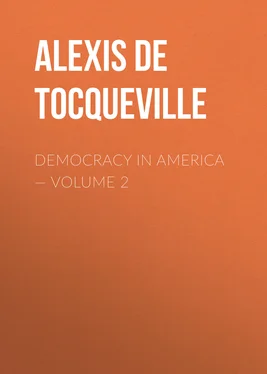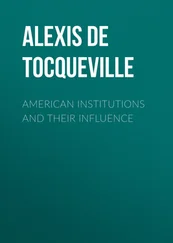Alexis de Tocqueville - Democracy in America — Volume 2
Здесь есть возможность читать онлайн «Alexis de Tocqueville - Democracy in America — Volume 2» — ознакомительный отрывок электронной книги совершенно бесплатно, а после прочтения отрывка купить полную версию. В некоторых случаях можно слушать аудио, скачать через торрент в формате fb2 и присутствует краткое содержание. Жанр: foreign_antique, Политика, foreign_edu, на английском языке. Описание произведения, (предисловие) а так же отзывы посетителей доступны на портале библиотеки ЛибКат.
- Название:Democracy in America — Volume 2
- Автор:
- Жанр:
- Год:неизвестен
- ISBN:нет данных
- Рейтинг книги:4 / 5. Голосов: 1
-
Избранное:Добавить в избранное
- Отзывы:
-
Ваша оценка:
- 80
- 1
- 2
- 3
- 4
- 5
Democracy in America — Volume 2: краткое содержание, описание и аннотация
Предлагаем к чтению аннотацию, описание, краткое содержание или предисловие (зависит от того, что написал сам автор книги «Democracy in America — Volume 2»). Если вы не нашли необходимую информацию о книге — напишите в комментариях, мы постараемся отыскать её.
Democracy in America — Volume 2 — читать онлайн ознакомительный отрывок
Ниже представлен текст книги, разбитый по страницам. Система сохранения места последней прочитанной страницы, позволяет с удобством читать онлайн бесплатно книгу «Democracy in America — Volume 2», без необходимости каждый раз заново искать на чём Вы остановились. Поставьте закладку, и сможете в любой момент перейти на страницу, на которой закончили чтение.
Интервал:
Закладка:
It cannot be denied that Christianity itself has felt, to a certain extent, the influence which social and political conditions exercise on religious opinions. At the epoch at which the Christian religion appeared upon earth, Providence, by whom the world was doubtless prepared for its coming, had gathered a large portion of the human race, like an immense flock, under the sceptre of the Caesars. The men of whom this multitude was composed were distinguished by numerous differences; but they had thus much in common, that they all obeyed the same laws, and that every subject was so weak and insignificant in relation to the imperial potentate, that all appeared equal when their condition was contrasted with his. This novel and peculiar state of mankind necessarily predisposed men to listen to the general truths which Christianity teaches, and may serve to explain the facility and rapidity with which they then penetrated into the human mind. The counterpart of this state of things was exhibited after the destruction of the empire. The Roman world being then as it were shattered into a thousand fragments, each nation resumed its pristine individuality. An infinite scale of ranks very soon grew up in the bosom of these nations; the different races were more sharply defined, and each nation was divided by castes into several peoples. In the midst of this common effort, which seemed to be urging human society to the greatest conceivable amount of voluntary subdivision, Christianity did not lose sight of the leading general ideas which it had brought into the world. But it appeared, nevertheless, to lend itself, as much as was possible, to those new tendencies to which the fractional distribution of mankind had given birth. Men continued to worship an only God, the Creator and Preserver of all things; but every people, every city, and, so to speak, every man, thought to obtain some distinct privilege, and win the favor of an especial patron at the foot of the Throne of Grace. Unable to subdivide the Deity, they multiplied and improperly enhanced the importance of the divine agents. The homage due to saints and angels became an almost idolatrous worship amongst the majority of the Christian world; and apprehensions might be entertained for a moment lest the religion of Christ should retrograde towards the superstitions which it had subdued. It seems evident, that the more the barriers are removed which separate nation from nation amongst mankind, and citizen from citizen amongst a people, the stronger is the bent of the human mind, as if by its own impulse, towards the idea of an only and all-powerful Being, dispensing equal laws in the same manner to every man. In democratic ages, then, it is more particularly important not to allow the homage paid to secondary agents to be confounded with the worship due to the Creator alone.
Another truth is no less clear—that religions ought to assume fewer external observances in democratic periods than at any others. In speaking of philosophical method among the Americans, I have shown that nothing is more repugnant to the human mind in an age of equality than the idea of subjection to forms. Men living at such times are impatient of figures; to their eyes symbols appear to be the puerile artifice which is used to conceal or to set off truths, which should more naturally be bared to the light of open day: they are unmoved by ceremonial observances, and they are predisposed to attach a secondary importance to the details of public worship. Those whose care it is to regulate the external forms of religion in a democratic age should pay a close attention to these natural propensities of the human mind, in order not unnecessarily to run counter to them. I firmly believe in the necessity of forms, which fix the human mind in the contemplation of abstract truths, and stimulate its ardor in the pursuit of them, whilst they invigorate its powers of retaining them steadfastly. Nor do I suppose that it is possible to maintain a religion without external observances; but, on the other hand, I am persuaded that, in the ages upon which we are entering, it would be peculiarly dangerous to multiply them beyond measure; and that they ought rather to be limited to as much as is absolutely necessary to perpetuate the doctrine itself, which is the substance of religions of which the ritual is only the form. 1 1 In all religions there are some ceremonies which are inherent in the substance of the faith itself, and in these nothing should, on any account, be changed. This is especially the case with Roman Catholicism, in which the doctrine and the form are frequently so closely united as to form one point of belief.
A religion which should become more minute, more peremptory, and more surcharged with small observances at a time in which men are becoming more equal, would soon find itself reduced to a band of fanatical zealots in the midst of an infidel people.
I anticipate the objection, that as all religions have general and eternal truths for their object, they cannot thus shape themselves to the shifting spirit of every age without forfeiting their claim to certainty in the eyes of mankind. To this I reply again, that the principal opinions which constitute belief, and which theologians call articles of faith, must be very carefully distinguished from the accessories connected with them. Religions are obliged to hold fast to the former, whatever be the peculiar spirit of the age; but they should take good care not to bind themselves in the same manner to the latter at a time when everything is in transition, and when the mind, accustomed to the moving pageant of human affairs, reluctantly endures the attempt to fix it to any given point. The fixity of external and secondary things can only afford a chance of duration when civil society is itself fixed; under any other circumstances I hold it to be perilous.
We shall have occasion to see that, of all the passions which originate in, or are fostered by, equality, there is one which it renders peculiarly intense, and which it infuses at the same time into the heart of every man: I mean the love of well-being. The taste for well-being is the prominent and indelible feature of democratic ages. It may be believed that a religion which should undertake to destroy so deep seated a passion, would meet its own destruction thence in the end; and if it attempted to wean men entirely from the contemplation of the good things of this world, in order to devote their faculties exclusively to the thought of another, it may be foreseen that the soul would at length escape from its grasp, to plunge into the exclusive enjoyment of present and material pleasures. The chief concern of religions is to purify, to regulate, and to restrain the excessive and exclusive taste for well-being which men feel at periods of equality; but they would err in attempting to control it completely or to eradicate it. They will not succeed in curing men of the love of riches: but they may still persuade men to enrich themselves by none but honest means.
This brings me to a final consideration, which comprises, as it were, all the others. The more the conditions of men are equalized and assimilated to each other, the more important is it for religions, whilst they carefully abstain from the daily turmoil of secular affairs, not needlessly to run counter to the ideas which generally prevail, and the permanent interests which exist in the mass of the people. For as public opinion grows to be more and more evidently the first and most irresistible of existing powers, the religious principle has no external support strong enough to enable it long to resist its attacks. This is not less true of a democratic people, ruled by a despot, than in a republic. In ages of equality, kings may often command obedience, but the majority always commands belief: to the majority, therefore, deference is to be paid in whatsoever is not contrary to the faith.
Читать дальшеИнтервал:
Закладка:
Похожие книги на «Democracy in America — Volume 2»
Представляем Вашему вниманию похожие книги на «Democracy in America — Volume 2» списком для выбора. Мы отобрали схожую по названию и смыслу литературу в надежде предоставить читателям больше вариантов отыскать новые, интересные, ещё непрочитанные произведения.
Обсуждение, отзывы о книге «Democracy in America — Volume 2» и просто собственные мнения читателей. Оставьте ваши комментарии, напишите, что Вы думаете о произведении, его смысле или главных героях. Укажите что конкретно понравилось, а что нет, и почему Вы так считаете.












